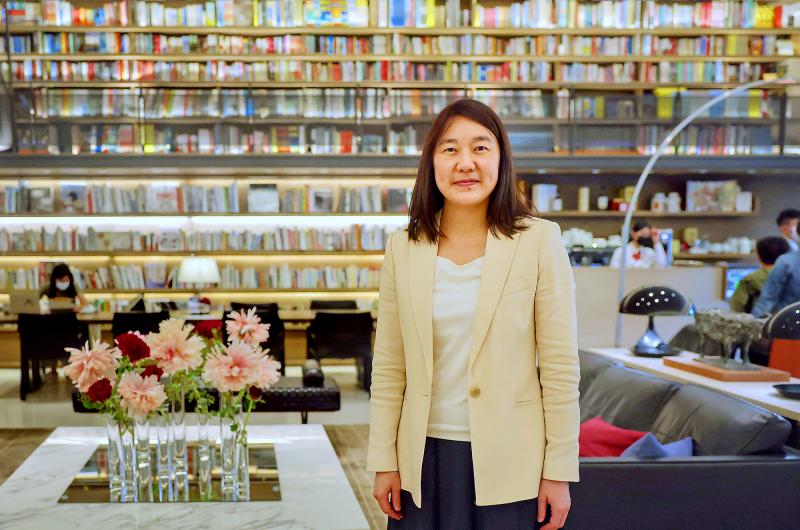Eslite Spectrum Corp, which runs the Eslite bookstore chain in Taiwan, is waiting for approval from its landlord to extend the lease for its 24-hour store in Taipei’s upscale Xinyi District (信義).
In its annual general meeting on Friday, Eslite chairwoman Mercy Wu (吳旻潔) told shareholders that the bookstore chain has been at a stalemate with conglomerate Uni-President Group, the largest of its seven landlords of the Xinyi store, in its talks to extend the location’s lease, which expires at the end of 2023.
The statement has raised fears that Taiwan’s only 24-hour bookstore could disappear if it cannot extend its lease.

Photo: CNA
The Xinyi store began 24-hour services in the spring of 2020, soon after the Eslite branch in the Dunnan (敦南) area closed in May that year. That branch opened in 1989 and began 24-hour operations in 1999.
Eslite has twice offered better terms in a bid to keep the location, with six of the seven landlords supporting the lease, and Uni-President Group being the only one to not respond, Wu said.
Eslite has agreed to a rent increase and to allow the landlords to share more of the sales revenue from the Xinyi branch, she said.
Eslite has paid NT$8 billion (US$272.57 million) in rent for the Xinyi branch over the past 18 years, she added.
Market sources said that Uni-President Group, which owns Taiwan’s largest food brand, Uni-President Enterprises Corp, and runs the 7-Eleven convenience store chain in Taiwan, owns an approximately 40 percent stake in the property where the Eslite Xinyi branch is located.
The other landlords include Prince Building and Development Corp, Tainan Spinning Co, Universal Real Estate Development Co and Kung Ching International Development Co.
Wu said many shareholders are concerned about whether the lease might be extended, adding that Eslite has been sincere in its dealings with the landlords about continuing the Xinyi branch, which attracts 12 million visitors a year.
Sources said Uni-President Group is considering using the property to extend the Uni-Ustyle department store, which is adjacent to the Eslite Xinyi outlet.
The Uni-President Group said that it is still considering the terms of the new contract given that there is ample time before the current lease expires.
Wu said that she hopes to receive a reply soon so that Eslite can move forward in its operational planning, emphasizing that her company does not want the location to close.
Eslite has new stores in New Taipei City’s Sindian District (新店) and Taichung scheduled to open next year, Wu said.
The Sindian store is planned to be an 19,000 ping (62,810m2) mega outlet within a shopping center being developed by the automaker Yulon Group, Wu said.
That branch is to contain restaurants, coffee shops and cultural creative stores, and is currently seeking tenants, she said, adding that the branch is expected to generate NT$4 billion to NT$5 billion a year, with food and beverage shops accounting for up to 40 percent of revenue.
Eslite is also planning a to open a new store in Tainan in 2024, which at 6,500 ping would be the largest bookstore in the city.

Chinese Nationalist Party (KMT) Chairman Eric Chu (朱立倫), spokeswoman Yang Chih-yu (楊智伃) and Legislator Hsieh Lung-chieh (謝龍介) would be summoned by police for questioning for leading an illegal assembly on Thursday evening last week, Minister of the Interior Liu Shyh-fang (劉世芳) said today. The three KMT officials led an assembly outside the Taipei City Prosecutors’ Office, a restricted area where public assembly is not allowed, protesting the questioning of several KMT staff and searches of KMT headquarters and offices in a recall petition forgery case. Chu, Yang and Hsieh are all suspected of contravening the Assembly and Parade Act (集會遊行法) by holding

PRAISE: Japanese visitor Takashi Kubota said the Taiwanese temple architecture images showcased in the AI Art Gallery were the most impressive displays he saw Taiwan does not have an official pavilion at the World Expo in Osaka, Japan, because of its diplomatic predicament, but the government-backed Tech World pavilion is drawing interest with its unique recreations of works by Taiwanese artists. The pavilion features an artificial intelligence (AI)-based art gallery showcasing works of famous Taiwanese artists from the Japanese colonial period using innovative technologies. Among its main simulated displays are Eastern gouache paintings by Chen Chin (陳進), Lin Yu-shan (林玉山) and Kuo Hsueh-hu (郭雪湖), who were the three young Taiwanese painters selected for the East Asian Painting exhibition in 1927. Gouache is a water-based

Taiwan would welcome the return of Honduras as a diplomatic ally if its next president decides to make such a move, Minister of Foreign Affairs Lin Chia-lung (林佳龍) said yesterday. “Of course, we would welcome Honduras if they want to restore diplomatic ties with Taiwan after their elections,” Lin said at a meeting of the legislature’s Foreign Affairs and National Defense Committee, when asked to comment on statements made by two of the three Honduran presidential candidates during the presidential campaign in the Central American country. Taiwan is paying close attention to the region as a whole in the wake of a

OFF-TARGET: More than 30,000 participants were expected to take part in the Games next month, but only 6,550 foreign and 19,400 Taiwanese athletes have registered Taipei city councilors yesterday blasted the organizers of next month’s World Masters Games over sudden timetable and venue changes, which they said have caused thousands of participants to back out of the international sporting event, among other organizational issues. They also cited visa delays and political interference by China as reasons many foreign athletes are requesting refunds for the event, to be held from May 17 to 30. Jointly organized by the Taipei and New Taipei City governments, the games have been rocked by numerous controversies since preparations began in 2020. Taipei City Councilor Lin Yen-feng (林延鳳) said yesterday that new measures by